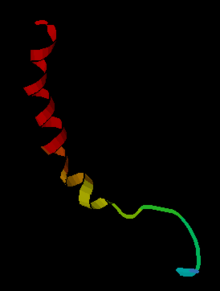
Back ببتيد عصبي Arabic Neuropeptid BS Neuropèptid Catalan پەیەپێپتاید CKB Neuropeptid Czech Neuropeptid Danish Neuropeptide German Neŭrona peptido EO Neuropéptido Spanish Neuropeptiidid ET

Neuropeptides are chemical messengers made up of small chains of amino acids that are synthesized and released by neurons. Neuropeptides typically bind to G protein-coupled receptors (GPCRs) to modulate neural activity and other tissues like the gut, muscles, and heart.
Neuropeptides are synthesized from large precursor proteins which are cleaved and post-translationally processed then packaged into large dense core vesicles. Neuropeptides are often co-released with other neuropeptides and neurotransmitters in a single neuron, yielding a multitude of effects. Once released, neuropeptides can diffuse widely to affect a broad range of targets.
Neuropeptides are extremely ancient and highly diverse chemical messengers. Placozoans such as Trichoplax, extremely basal animals which do not possess neurons, use peptides for cell-to-cell communication in a way similar to the neuropeptides of higher animals.